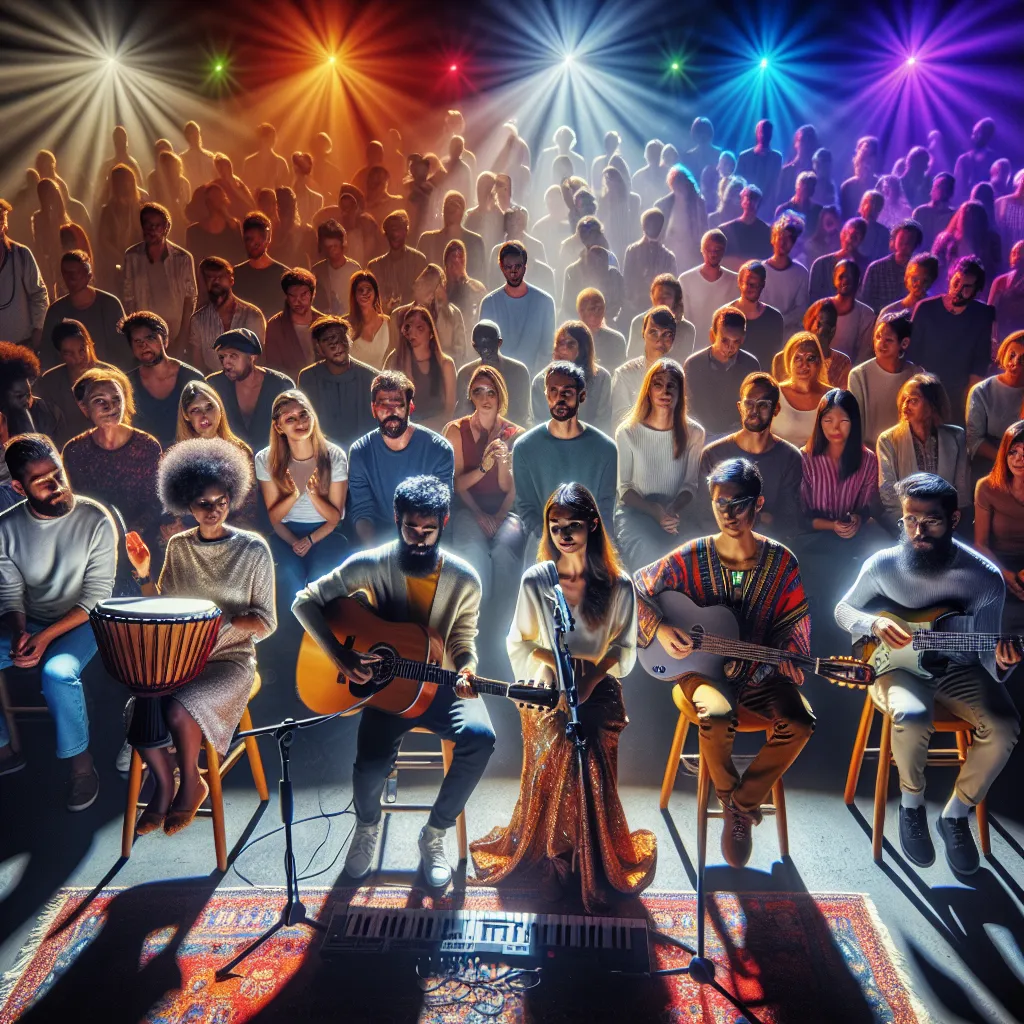Describing a recent concert or performance is a common topic in IELTS Speaking tests. This topic allows examiners to assess your ability to recount personal experiences, express opinions, and use appropriate vocabulary related to entertainment and events. Let’s explore how to effectively answer questions about this topic and maximize your speaking score.
Nội dung bài viết
- Part 1: Introduction and Interview
- Do you enjoy going to concerts or performances?
- What type of concerts or performances do you prefer?
- Part 2: Long Turn
- Cue Card
- Sample Answer (Band 8-9)
- Follow-up Questions
- Part 3: Two-way Discussion
- How do you think technology has changed the way we experience live performances?
- Do you think the cost of concert tickets is justified? Why or why not?
- Key Vocabulary and Phrases
- Examiner’s Advice
Part 1: Introduction and Interview
In this section, the examiner may ask general questions about concerts and performances. Here are some possible questions and sample answers:
Do you enjoy going to concerts or performances?
Band 6-7 Answer:
Yes, I do enjoy attending concerts and performances. They’re a great way to relax and have fun with friends. I try to go to at least one or two shows a year.
Band 8-9 Answer:
Absolutely! I’m quite passionate about live performances. There’s something truly captivating about experiencing music or theater in person. I make it a point to attend a diverse range of shows throughout the year, from classical concerts to modern dance performances.
What type of concerts or performances do you prefer?
Band 6-7 Answer:
I prefer rock concerts. I like the energy of the crowd and the loud music. It’s always exciting to see my favorite bands perform live.
Band 8-9 Answer:
I have a particular affinity for jazz concerts. I find the improvisational nature of jazz incredibly fascinating. The way musicians interact and respond to each other on stage creates a unique experience every time. That said, I also appreciate the grandeur of classical orchestras and the raw energy of rock performances.
Part 2: Long Turn
In this section, you’ll be given a cue card with a topic to speak about for 1-2 minutes. Here’s a sample cue card related to our theme:
Cue Card
Describe a recent concert or performance you attended.
You should say:
- What type of concert or performance it was
- Where and when you attended it
- Who you went with
- And explain why you enjoyed it or not
Sample Answer (Band 8-9)
I’d like to talk about a remarkable jazz concert I attended last month at the Royal Albert Hall in London. It was a tribute performance to the legendary Miles Davis, featuring a stellar lineup of contemporary jazz musicians.
The concert took place on a Friday evening, and I went with my cousin, who’s also a huge jazz enthusiast. We were both incredibly excited about the event, as it had been highly anticipated in the jazz community.
From the moment the first note was played, I was completely mesmerized. The musicians skillfully reinterpreted Davis’s classic compositions, infusing them with their own unique styles while still maintaining the essence of the original works. The trumpet player, in particular, was phenomenal, capturing Davis’s signature sound with uncanny accuracy.
What I enjoyed most about the concert was the palpable energy in the hall. You could feel the audience’s collective appreciation for the music, and there were moments of spontaneous applause after particularly impressive solos. The acoustics of the venue were superb, allowing us to hear every nuance of the performance.
I left the concert feeling thoroughly inspired and with a renewed appreciation for jazz music. It was a truly unforgettable experience that reminded me of the power of live performances to move and uplift the human spirit.
Follow-up Questions
- How often do you attend concerts or performances?
Band 8-9 Answer: I make it a point to attend live performances quite regularly, typically once or twice a month. I believe it’s important to support the arts and experience different forms of creative expression. Whether it’s a small local gig or a major international act, I find that each performance offers a unique perspective and enriches my cultural understanding.
- Do you think live performances are better than recorded music?
Band 8-9 Answer: While both have their merits, I personally believe that live performances offer a more immersive and authentic experience. There’s an undeniable energy that comes from being in the same space as the performers, feeling the music reverberate through your body, and sharing that moment with other audience members. Live shows also offer the opportunity to witness spontaneous moments of creativity, like improvised solos or unique arrangements, which you don’t get with recorded music. However, I do appreciate the polished quality and accessibility of recorded music, which allows us to enjoy our favorite artists anytime, anywhere.
 IELTS Speaking concert performance
IELTS Speaking concert performance
Part 3: Two-way Discussion
In this section, the examiner will ask more abstract questions related to the topic. Here are some possible questions and sample answers:
How do you think technology has changed the way we experience live performances?
Band 6-7 Answer:
Technology has made big changes to live performances. Now we can buy tickets online easily and sometimes watch concerts live on our phones or computers. Some performers use special effects and big screens to make their shows more exciting.
Band 8-9 Answer:
Technology has revolutionized the live performance experience in numerous ways. Firstly, it has democratized access to events through online ticketing platforms and live streaming services, allowing people from all over the world to participate. Additionally, technology has enhanced the visual and auditory aspects of performances through advanced lighting systems, high-quality sound equipment, and immersive special effects.
Moreover, social media has created a new dimension of audience engagement, enabling fans to interact with artists and share their experiences in real-time. However, this technological integration also poses challenges, such as the potential for distraction with people using smartphones during performances. Ultimately, while technology has undoubtedly expanded the possibilities for live entertainment, it’s crucial to strike a balance that preserves the authentic, human connection that makes live performances so special.
Do you think the cost of concert tickets is justified? Why or why not?
Band 8-9 Answer:
This is a nuanced issue that requires considering multiple factors. On one hand, high ticket prices can be justified by the substantial costs involved in producing large-scale concerts, including venue rental, equipment, staff wages, and the artists’ fees. Furthermore, for many fans, the unique experience and emotional value of seeing their favorite artists perform live can justify a premium price.
However, I believe there’s a valid argument that excessively high ticket prices can make live music inaccessible to many people, potentially alienating fans and limiting the diversity of concert audiences. This could have long-term negative effects on the music industry and cultural participation.
Ideally, I think a balanced approach is needed. This could involve offering a range of ticket options at different price points, implementing dynamic pricing strategies, or organizing more free or low-cost community events. Ultimately, while artists and promoters have the right to set their prices, they should also consider the long-term sustainability of their fan base and the broader cultural impact of their pricing decisions.
Key Vocabulary and Phrases
To achieve a high band score in IELTS Speaking, it’s crucial to use a wide range of vocabulary accurately. Here are some key terms and phrases related to concerts and performances:
-
Captivating (adj.) /ˈkæptɪveɪtɪŋ/ – Capable of attracting and holding interest; charming.
Example: The lead singer’s captivating performance left the audience spellbound. -
Mesmerize (v.) /ˈmezməraɪz/ – To hold the attention of someone to the exclusion of all else or so as to transfix them.
Example: The intricate guitar solo mesmerized the entire crowd. -
Acoustics (n.) /əˈkuːstɪks/ – The properties or qualities of a room or building that determine how sound is transmitted in it.
Example: The concert hall’s excellent acoustics enhanced the overall listening experience. -
Improvisational (adj.) /ɪmˌprɒvəˈzeɪʃənl/ – Characterized by, or subject to improvisation.
Example: Jazz music is known for its improvisational nature, allowing musicians to express their creativity in the moment. -
Palpable (adj.) /ˈpælpəbl/ – Able to be touched or felt; easily perceived.
Example: There was a palpable excitement in the air as the audience waited for the concert to begin. -
Immersive (adj.) /ɪˈmɜːsɪv/ – Providing, involving, or characterized by deep absorption or immersion in something.
Example: The use of 3D visuals created an immersive concert experience.
Examiner’s Advice
To excel in the IELTS Speaking test when discussing concerts and performances:
-
Use specific examples: Rather than speaking generally, refer to specific concerts or performances you’ve attended. This demonstrates your ability to recount personal experiences.
-
Employ descriptive language: Use vivid adjectives and adverbs to bring your descriptions to life. This showcases your vocabulary range and ability to paint a picture with words.
-
Express opinions with justification: Don’t just state whether you enjoyed something or not; explain why. This demonstrates your critical thinking skills.
-
Use idiomatic expressions: Incorporate relevant idioms naturally into your responses to show fluency and cultural understanding.
-
Practice topic-specific vocabulary: Familiarize yourself with terms related to music, theater, and live performances to speak more confidently about these subjects.
Remember, the key to success in IELTS Speaking is not just about what you say, but how you say it. Speak clearly, maintain good eye contact, and show enthusiasm for the topic. With practice and preparation, you can confidently discuss your experiences with concerts and performances, showcasing your English language skills effectively.


